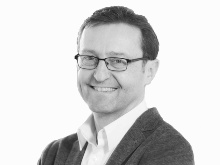IntCDC Participating Researcher Prof. Steffen Staab (KI) has been appointed a Fellow of the prestigious Association for Computing Machinery (ACM) in recognition of his research contributions to the field of Knowledge Technologies, which is gaining in practical importance.
"I am delighted to have been honored with this title, which has only been awarded to a few German-speaking researchers to date," said Staab. The 54-year-old is researching ways in which computers can be made to solve complex problems through data and knowledge-based learning. "Up to now,” Staab explains, “artificial intelligence algorithms have been trained using datasets, which however, are often insufficient to comprehensively train an algorithm. This is why,” he continues, “my team and I are looking into ways to solve this problem by exploiting existing knowledge, which we have so far made insufficient use of." The computer scientist is pursuing this problem through interdisciplinary collaboration at the University of Stuttgart, within the "Data-integrated Simulation Science" (SimTech) Cluster of Excellence and in Cyber Valley, Europe's leading academic and industry consortium for AI research.
Better synthetic fertilizer and cancer simulations
Examples that illustrate Staab's research include artificial fertilizers and cancer. It would be ideal for both the agricultural sector and society in general if only the minimum amount of fertilizer were spread over a field to achieve the necessary concentration in the soil, which is not so easy because soil conditions vary greatly. Cancer is also subject to wide variations: whereas one tumor may grow in a branching form, another may remain compact, which has implications in terms of treatment. Researchers, such as Staab, are currently working at SimTech on the development of simulations that make such complex processes more predictable.
As Staab explains: "We often don't know which part of the complex mathematical description – which is the starting point for a simulation – is of particular relevance when it comes to achieving meaningful results." Yet this would be important for the simulation. “This,” he continues, “is where AI algorithms can help but we need to train them on existing data, which is often rather scarce. If, however, we could also draw upon existing knowledge, the simulations could be carried out in a more stringent and realistic manner.” In many cases in fact, this knowledge is already available from laboratory studies carried out by other researchers – in some cases many years ago – on both synthetic fertilizers and tumors. "One could also refer to our approach as knowledge-infused simulation science," says Staab.
About the Association for Computing Machinery
The ACM is the world's largest and oldest scientific association for computer science. It comprises experts from the fields of education and research and aims to promote computer science both as a science and as a profession. The ACM also awards the Turing Prize, the highest honor in computer science. To be selected as an ACM Fellow, one's personal achievements in the fields studied by the ACM members must be outstanding.
About Prof. Steffen Staab
Steffen Staab was born in Würzburg in 1970 and studied Computer Science and Computer Linguistics at both the University of Erlangen-Nuremberg and the University of Pennsylvania. He received his doctorate in Computer Science from the University of Freiburg in 1998. He then went on to work at the University of Stuttgart’s Institute of Human Factors and Technology Management (IAT) as well as at the Fraunhofer Institute for Industrial Engineering (IAO), and later moved to the University of Karlsruhe (now known as KIT). In 2004, Staab was appointed Professor of Databases and Information Systems at the University of Koblenz and Landau, where he founded the Institute for Web Science and Technologies (WeST) in 2009. He has also held the Chair for Web and Computer Science at the University of Southampton since March 2015.
Staab took up a Cyber Valley Professorship for Analytical Computing at the University of Stuttgart in February 2020. He founded the University's Institute for Artificial Intelligence where he serves as Managing Director and is also one of the two spokespersons for the SimTech Cluster of Excellence.



